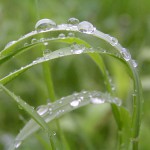Raining & praying
 There’s an old saying that everyone talks about the weather, but no-one does anything about it.
There’s an old saying that everyone talks about the weather, but no-one does anything about it.
Judaism proves the saying wrong.
We know that the year needs to alternate between winter and summer, and that there are times when we need dew and times when we need rain. Hence our practice of praying for rain on Sh’mini Atzeret and for dew on Pesach.
How, one might ask, does praying for dew or rain constitute doing something about the weather?
Our method is not that of the rainmaker in some cultures, who uses the principles of imitative magic: “If they wish to make rain,” JG Frazer says in The Golden Bough, “they simulate it by sprinkling water, or mimicking clouds; if their object is to stop rain and cause drought, they avoid water and resort to warmth and fire for the sake of drying up the too abundant moisture”.
What we do is to see God as the source of all blessing and to tell Him of our yearning for the blessing of the right weather at the right time.
But, it might be said, how can Jews in the southern hemisphere pray for rain on Sh’mini Atzeret which is the beginning of their summer?
In Australia this argument was actually taken seriously at one stage and the prayers were reversed, with the prayer for rain being said on Pesach and the prayer for dew on Sh’mini Atzeret “on account of the difference in the seasons between the hemispheres”.
In recent decades the universal practice has been restored; Rabbi SM Lehrman wrote (“Jewish Chronicle”, 14 Oct., 1960), “The very act of praying for rain for the land of Israel, by worshippers who lived in countries that had more than their share of this precious commodity, linked the scattered fragments of the House of Israel into one corporate people.”
Hence when it rains in Israel, there is joy in Australia; when the water in the Kinneret is low, there is concern in Canada and Colombia.
For this reason, Y’hudah HaLevi’s words are still true – “My heart is in the east: I am in the west”.



